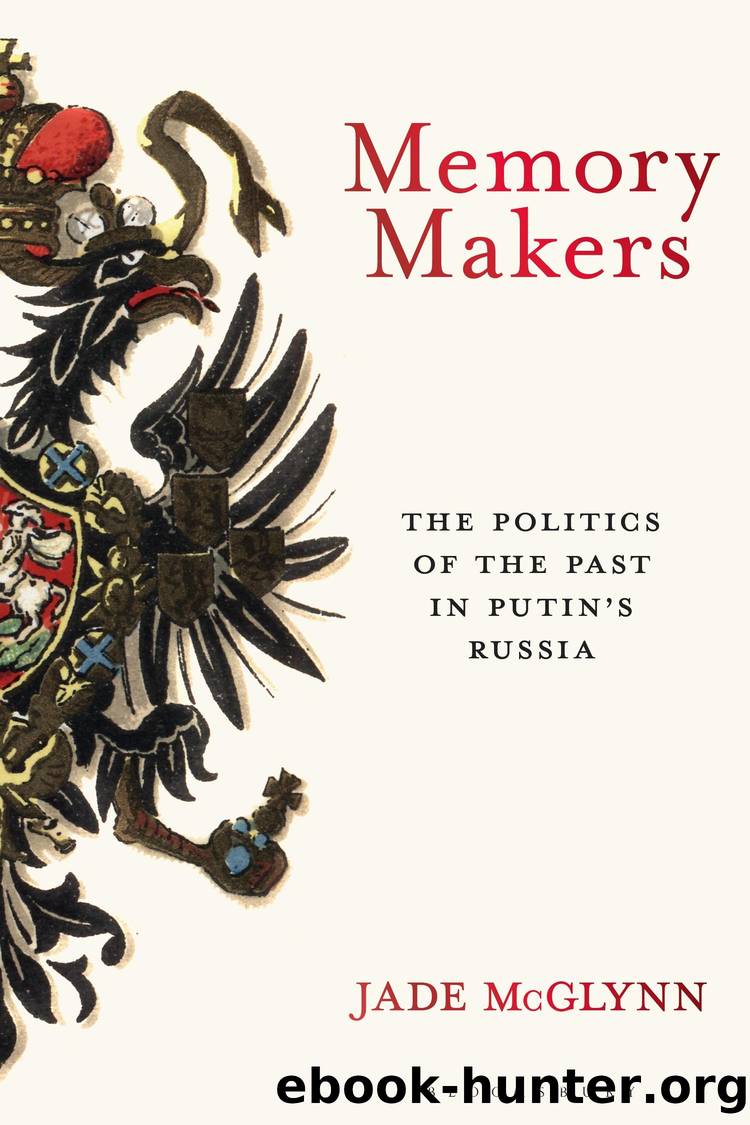Memory Makers by Jade McGlynn;

Author:Jade McGlynn; [McGlynn, Jade]
Language: eng
Format: epub
ISBN: 9781350280779
Publisher: Bloomsbury UK
Published: 2023-02-18T00:00:00+00:00
Messianism
The media defines those resisting the onslaught of enemies, whether at home or abroad, as actively mobilized against identity-based threats.3 From 2012 to 2014, the âcounter-rhetoric of hysteriaâ, or the hysterical justifications of any Russian aggression as pre-emptive, was one way politicians sought to depict their country as the victim of the international order â unfairly lampooned by resurrected Nazis and the cruel West (Pasitselska 2017). However, by 2015 a new approach was needed â one that characterized Russia as an assertive actor and channelled its obsession with history into a clearer sense of purpose. Consequently, following Russiaâs intervention in Syria, the media and politicians replaced the highly defensive tone, typical of coverage of Ukraine and third-wave sanctions, with self-congratulatory gloating as they moulded an image of Russia asserting rather than defending itself (Kazun 2016). The discursive transformation from defensiveness in 2014 to bombast and messianism in 2015 mirrored a change in how the media positioned the governmentâs actions as well as the evolution of Russiaâs role on the world stage. The mediaâs increasingly messianic depiction of Russian identity was a clear link between historical framing and the governmentâs strategy to intensify the significance of history to national identity, a strategy explored further in Chapter 6.
The media and government built the argument, which emerged steadily from 2012 and had crystallized by 2015, that Russia must not only forge its own path but also act as a beacon, helping others to find their own paths. This neatly folds back into the worldview that sits at the base of the historical lessons being promoted: Russia as a strong state, with a special path of development and a great power mission. Russian elite political rhetoric and self-understanding has long embraced elements of messianism, from the promulgation of Moscow as the Third Rome to the Soviet Unionâs universalist identity as the first international workersâ state (Duncan 2002; Kukulin 2018; Berdyaev 1922, 1990; Rabow-Edling 2006). Moreover, messianic thinking is particularly complementary to the Kremlinâs presentist uses of history, especially if we employ Walter Benjaminâs definition of messianism as a âsimultaneity of past and future in an instantaneous presentâ (Benjamin 1968: 265). Certainly, a strong sense of messianism has become increasingly apparent as the klaxon of the call to history has grown ever louder, heralding Russiaâs bloodthirsty âliberationâ of Ukraine in 2022.
Although it can take different forms, this messianic tone has relied on a self-assurance, buoyed by a chauvinistic understanding of history that depicts Russia as saviour of, if not the world, then at least the Eurasian landmass. The example from the MFA below is rather typical in this sense:
Download
This site does not store any files on its server. We only index and link to content provided by other sites. Please contact the content providers to delete copyright contents if any and email us, we'll remove relevant links or contents immediately.
The Secret History by Donna Tartt(16619)
The Social Justice Warrior Handbook by Lisa De Pasquale(11489)
Thirteen Reasons Why by Jay Asher(7786)
This Is How You Lose Her by Junot Diaz(5768)
Weapons of Math Destruction by Cathy O'Neil(5034)
Zero to One by Peter Thiel(4823)
The Myth of the Strong Leader by Archie Brown(4789)
Promise Me, Dad by Joe Biden(4444)
Stone's Rules by Roger Stone(4415)
Beartown by Fredrik Backman(4414)
How Democracies Die by Steven Levitsky & Daniel Ziblatt(4398)
The Fire Next Time by James Baldwin(4341)
100 Deadly Skills by Clint Emerson(4076)
A Higher Loyalty: Truth, Lies, and Leadership by James Comey(4031)
Rise and Kill First by Ronen Bergman(4012)
The David Icke Guide to the Global Conspiracy (and how to end it) by David Icke(3881)
The Farm by Tom Rob Smith(3871)
Secrecy World by Jake Bernstein(3782)
The Doomsday Machine by Daniel Ellsberg(3730)
